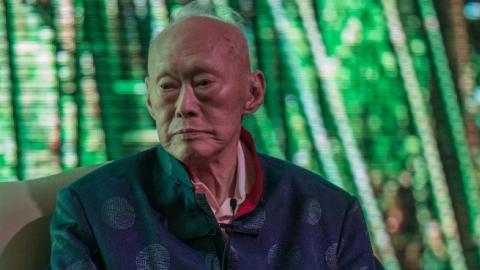Lee Kuan Yew, who died Monday at age 91, is rightly heralded as the founder of modern Singapore. As prime minister from 1959 to 1990, Lee led his country’s transformation from a swamp-infested island into a prosperous, first-world metropolis. He did so in part by allowing economic freedom to flourish, giving the people of Singapore a chance to achieve their full potential.
The marketplace of ideas was another matter. Singaporeans are less fortunate when it comes to political and personal freedoms, among them free speech and free access to information.
Lee famously was a foe of the Western press. “We allow American journalists in Singapore in order to report Singapore to their fellow countrymen,” he told the American Society of Newspaper Editors in 1988. “But we cannot allow them to assume a role in Singapore that the American media play in America, that is, that of invigilator, adversary and inquisitor of the administration.”
In the late 1980s and 1990s, almost every international publication that circulated in Singapore tangled with the government over its news coverage of the city-state, and faced lawsuits or the threat of lawsuits. A partial list includes the Economist magazine, the International Herald Tribune, Newsweek, Reuters and Time. I am unaware of any news organization that prevailed in a Singapore court.
Dow Jones, publisher of this newspaper and the now-defunct Far Eastern Economic Review, took the biggest hits. In 1985 Singapore sued The Asian Wall Street Journal over an editorial that criticized the government’s harassment of one of the two opposition members in the Parliament. Dow Jones later faced additional lawsuits, restrictions on circulation, and rejections of visas and work permits for its reporters.
In 1986 Singapore’s Parliament passed a law restricting the sale or distribution of any foreign publication found to be “engaging in the domestic politics” of the country, the interpretation of which was left to the Minister of Communications and Information. Once the minister published his finding in the official government Gazette, he could order that the circulation and distribution of the offending publication be curtailed. This process was known as “gazetting.”
What was Lee afraid of? The answer, in a word, was readers. He had little confidence in the ability of Singaporeans to listen to different points of view, evaluate them and form correct opinions, which is to say, his opinions.
“Many people are uncritically imitative,” Lee said in an address in 1971 to the International Press Institute in Helsinki. “A report of an airplane hijacking leads to a rash of hijackings in other unexpected places. A report of a foreign diplomat kidnapped for ransom by dissident groups is quickly followed by similar kidnapping in other countries.” He pointed to examples in Singapore, where in his view press reports sparked riots, which led to deaths.
Lee concluded his Helsinki speech with the following line, which he quoted approvingly in his autobiography: “Freedom of the press, freedom of the news media, must be subordinated to the overriding needs of the integrity of Singapore, and to the primacy of purpose of an elected government.”
One of my favorite stories from the Lee Kuan Yew press wars dates to the late 1980s, when Singapore had gazetted The Asian Wall Street Journal, cutting its circulation to 400 copies a day from about 5,000. The cuts were in retaliation for the Journal’s refusal to print verbatim two long letters from the Monetary Authority of Singapore. The government ordered that many of the approved copies go to government or quasi-government libraries.
One day the phone rang at the Journal’s bureau in Singapore. The prime minister’s office wanted to know where Mr. Lee’s subscription was. Yes, we know that your circulation has been restricted, the caller said, but surely this doesn’t apply to the prime minister.
The Journal representative replied that Mr. Lee would receive no special treatment. In other words, if the prime minister valued the Journal’s reporting and commentary, he had the same option that was available to all Singaporeans who were deprived of their newspaper: Go to the library.




















